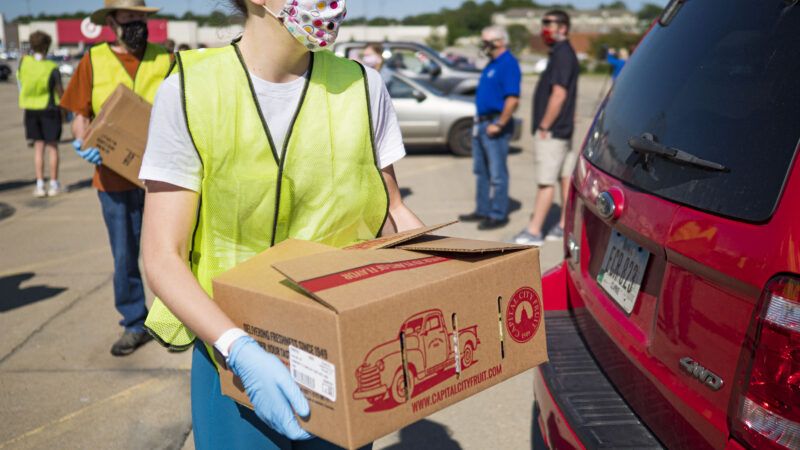Congressional Report Confirms Trump's USDA Food-Box Program Was a Huge Waste of Money
Replacing parts of SNAP with a poorly overseen food delivery program turned out to be an expensive disaster.

A congressional report released this month by House Democrats confirms two things many people already knew. First, the U.S. Department of Agriculture's widely panned food-box scheme, a signature Trump administration program, funneled billions of taxpayer dollars to inexperienced, underqualified organizations to distribute food to food banks—and the needy Americans they assist—during the Covid pandemic. Then, even after allegations of waste, incompetence, and fraud gripped the program, the report concludes, the USDA basically twiddled its thumbs.
"The report lends new evidence to previous allegations that the taxpayer-funded program paid contractors well over market price for food, placed undue burdens on already-taxed food banks and pantries, then failed to conduct sufficient oversight on the contractors it flagged for potential fraud," reported The Counter, where I also contribute, in a piece last week on the new congressional report.
In early 2018, the Trump administration created a program, dubbed Harvest Boxes, to replace parts of the Supplemental Nutrition Assistance Program (or SNAP, formerly food stamps). Under the plan, the USDA would gut the overpriced SNAP program, which costs taxpayers more than $85 billion a year, and replace parts of it with a new agency-sponsored food delivery program.
The premise behind the Harvest Box was simple. Instead of giving qualified people funds they may only spend on approved foods—SNAP—why not just give those same people food? A key element of the program involved government purchases of billions of dollars in surplus food from U.S. farmers.
The program's simple premise, though, was deeply flawed. As I detailed in a 2018 column, withering criticism of the Harvest Box program came from all corners. Reason's Eric Boehm likened it to "Amazon Prime, but for terrible canned food selected by bureaucrats." Rep. Jim McGovern (D–Mass.) called Harvest Boxes a "'cruel and demeaning and an awful idea' that would strip families of the ability to choose which groceries they buy." USA Today's editorial board dubbed it "a program fresh from Cold War Bulgaria." I wrote that the Harvest Box program was "truly rotten to the core and unworthy of consideration."
When the COVID-19 pandemic gripped the country, the USDA rejiggered the Harvest Box program. The new "Farmers to Families Food Box Program," I wrote in a May 2020 column, was merely "a Covid-era repackaging of the administration's oft-ridiculed Harvest Box scheme."
The new 63-page congressional report, Farmers to Families?, takes a closer look at the program, focusing on nearly $100 million that was awarded to three of the "underqualified companies" with "questionable experience" that were contracted by USDA to provide food boxes to food banks around the country.
One of the companies that secured a contract, as detailed in the congressional report, is CRE8AD8, a wedding- and event-planning company in Texas. "The wedding planning business had no experience in this industry, no facilities, no license, and no trucks," the Texas Standard reported in summer 2020. "It has struggled to deliver on its $40 million contract." That contract was not renewed.
The new congressional report says CRE8AD8 reported its profits "for one month's worth of deliveries" under the program may have totaled nearly $8 million. CRE8AD8 wasn't the only one profiting mightily from those transactions. "CRE8AD8 confirmed that contractors in the Food Box Program sometimes paid well above market prices, with farmers and producers receiving from CRE8AD8 up to ten times the price they would normally get from grocery stores," the congressional report states.
Though galling, none of this is exactly news. As I noted last year, reports indicated the Farmers to Families Food Box Program had "awarded millions of dollars to companies with little or no experience distributing bulk food."
While making much that same point, the new congressional report concludes the USDA should "take more care in evaluating contractors, issue and enforce guidance on eligible partner organizations and emergency pricing… when designing and implementing future food distribution programs."
I'm sorry, but future food distribution programs? Did Congress learn nothing from this wastefulness? (No, Congress did not learn anything. Yes, Congress learned nothing.)
At best, government food boxes give people dramatically overpriced food they may not want. At worst, these food boxes waste taxpayer money without even providing that food. On the other hand, SNAP, which gives qualified people funds they may only spend on government-approved foods, has also seen its share of waste and fraud.
If neither SNAP nor food boxes are the answer, then what should replace those programs? As I've argued many times, the federal government should give cash to eligible people so they may put that money towards their own basic needs. "Future food distribution programs" be damned.


Show Comments (408)